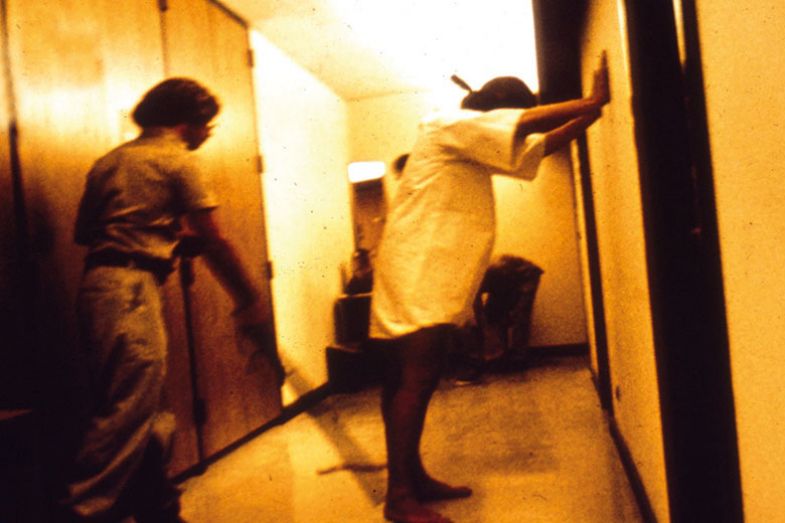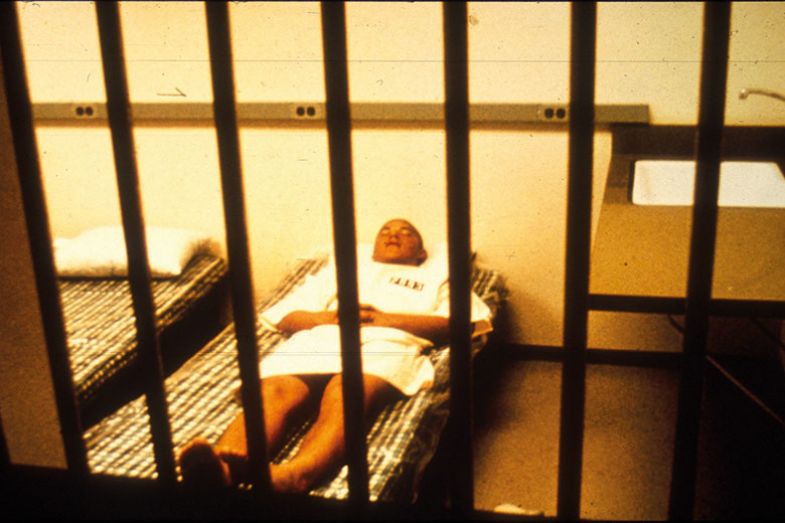In 1971, Stanford psychology professor Philip Zimbardo and colleagues randomly divided a group of male student volunteers into “guards” and “prisoners” and put them in a mock prison. Although the experiment was meant to last two weeks, according to the website devoted to the study, it “had to be ended after only six days because of what the situation was doing to the college students who participated. In only a few days, our guards became sadistic and our prisoners became depressed and showed signs of extreme stress.”
The Stanford Prison Experiment rapidly became a classic. It features in every standard psychology textbook. It reliably intrigues and disconcerts first-year psychology students. It has been used to explain how seemingly ordinary people committed atrocities during the Holocaust and to highlight the immense difficulties of prison reform. It is also seen as evidence for a particular view of human nature that is both pessimistic (we are all capable of doing terrible things) and reassuring (we are not personally responsible but swayed by situational factors beyond our control).
But what if there is something fundamentally flawed about the Stanford experiment itself?
Earlier this year, French researcher Thibault Le Texier drew on Professor Zimbardo’s own recently released papers to produce a book titled Histoire d’un Mensonge (The Story of a Lie). This argues that the experiment was more like cinema than science, alleging that the researchers constantly manipulated what was happening in the “prison” and, having decided their conclusions in advance, interpreted the results in a biased manner.

Meanwhile, Ben Blum produced a long article in the online magazine Medium called “The Lifespan of a Lie”, partly inspired by the experience of his cousin Alex, who was involved in an armed bank robbery. When he appeared in court, his defence team called Professor Zimbardo as an expert witness to argue that his actions were not an expression of his own free will but the result of “situational forces” arising from his involvement in a US Army Ranger indoctrination programme. Although he received a light sentence, he later came to realise that it was crucial to his personal development to stop seeing himself as a victim and to acknowledge responsibility for his actions.
After interviewing some of the original participants in the Stanford Prison Experiment, Dr Blum argued that one of the most dramatic prisoner “breakdowns” was in fact faked by someone who just wanted to leave the experiment, that the researchers encouraged certain forms of behaviour, and that many of the participants played up to them. Others have suggested that the initial advertisements referring to a “psychological study of prison life” may have influenced the kind of person who applied to take part and so skewed the results.
Such criticisms raise major questions about the scientific validity of the experiment, its alleged lessons and the later work that has been built on its foundations.
“I don’t think it is a good idea to draw any scientific conclusions from the study,” Simine Vazire, associate professor of psychology at the University of California, Davis, told Times Higher Education. “I think we need to go back and re-evaluate a lot of classic studies and studies that are the basis for the conclusions we teach our students…My sense of the literature on ‘the power of the situation’ is that there surely is such an effect (ie, the situation, including roles, is relevant for predicting people’s behaviours), but that the effect is not nearly as large as the SPE and current social psychological theory presents it as being.”

Gregory Feist, professor of psychology at San Jose State University, is a personality psychologist who has never believed that “situational forces can fully or nearly fully explain behaviour, including evilness”. Although Professor Zimbardo’s study formed “one fairly large brick in [the] wall” of what he called “the nurture-only perspective”, this wall has long been collapsing owing to “the rise of behavioural genetics, neuroscience and evolutionary psychology”. The new criticisms of the Stanford experiment merely helped to “completely undermine [its] ‘all about the situation’ narrative”.
Two very surprising people, however, have taken a different line and come out in favour of continuing engagement with Professor Zimbardo’s work. Stephen Reicher, Wardlaw professor of psychology at the University of St Andrews, and Alexander Haslam, professor of social and organisational psychology, University of Queensland, were responsible for the BBC Prison Study. This was filmed for a 2002 television series called The Experiment and used a similar format to the Stanford study, to take it further and to challenge some of its conclusions.
“The received wisdom on the SPE is about conformity,” explained Professor Reicher. “People slip into their roles. When we looked closely, we found a lot of examples of resistance, people not slipping into roles, people challenging the guards. The question which interested us was: when do people act in role and when do they resist this? [The Stanford experiment revealed some] interesting phenomena, but we still wanted to know more about the phenomena themselves and we just didn’t buy the explanation.”

In character: guards in the Stanford Prison Experiment became “sadistic”
Although Professor Reicher claimed that he had “always had great respect” for Professor Zimbardo and even invited the Stanford professor to act as a consultant on the project, he proved extremely hostile. When a paper about the BBC prison study was published in the British Journal of Social Psychology in 2006, it was accompanied by Professor Zimbardo’s damning “commentary”. As well as describing the paper as “not acceptable for publication in any scientific journal”, he dismissed as “fraudulent” what he called a “scientifically irresponsible ‘made-for-TV study’”.
In response, Professor Reicher considered legal action but eventually decided against it.
In the light of this acrimonious background, it is remarkable that the two research teams have now issued a “consensus statement” regretting any earlier “ad hominem criticisms” and “intemperate language” and stating their joint commitment to “develop[ing] a scientific understanding of toxic human behaviour, including brutality and the abuse of authority and power…we regard the Stanford Prison Experiment and BBC Prison Study as valid studies and valuable resources for advancing such understanding. At the same time, we recognise that both investigations have methodological limitations and are best viewed as one-trial demonstration studies rather than traditional experiments.”
Given the bad blood between them, his own reservations about the Stanford experiment and the new information that has emerged about it, what had led Professor Reicher to make friends with his old adversary Professor Zimbardo?
The Stanford Prison Experiment, he replied, had been “very powerful in bringing to light certain phenomena”. It could also be seen in the context of “an era of very powerful field studies”. Others included Stanley Milgram’s equally famous experiment on obedience to authority, from 1961, and Muzafer Sherif’s Robbers Cave experiment of 1954, when he “puts ordinary boys in competition and suddenly finds them becoming incredibly hostile”.
What all these studies demonstrate is that “if you manipulate the situations and social relations in which people find themselves, you find their behaviour changing dramatically. They show how particular contexts get people to act in ways you would not expect.”
More recently, in Professor Reicher’s view, both ethical and technical considerations mean that “we have lost that grand scale of creating immersive social worlds and looking at the impact on behaviour”. Much psychological research consists of “very short-lived laboratory studies” or uses “new technologies such as imaging, which can look at other levels of explanation such as the intrapsychic and neural. That unbalances the discipline, because it can look at one level of explanation and stops us getting equally powerful insights into other levels of variation. The ambition and the verve and the power of those [earlier] studies is something immensely important.”
The other reason for burying the hatchet with old enemies, in Professor Reicher’s view, is “to say: Let’s focus on the ideas. Let’s not make any statements about each other’s characters, let’s have a genuine debate of ideas. Having said that, we will be very robust in being critical in terms of ideas…That’s what academia should be about – robust but respectful disagreement…Just writing off Zimbardo stops the debate and the argument.”
matthew.reisz@timeshighereducation.com
The Stanford Prison Experiment: what happened
The Stanford Prison Experiment began with nine “prisoners” and nine “guards”. The former were stripped naked and deloused on arrival, given an ID number and dressed in a smock with no underclothes, rubber sandals and a stocking cap, with a heavy chain on their right ankles.
They had no access to windows or clocks to track the passing of time and were blindfolded when taken to the toilet. During the night, they were regularly woken up by a loud whistle for “counts”. As well as cells with steel bars, a small closet known as “The Hole” was available for solitary confinement.
The guards wore khaki uniforms and reflecting sunglasses. When the prisoners rebelled and barricaded themselves in their cells as early as the second day, they sprayed them with carbon dioxide from a fire extinguisher, put the ringleader into solitary confinement and introduced a 10pm “lock-up”, forcing prisoners to urinate and defecate in their cells.
Less than 36 hours into the experiment, one prisoner became acutely disturbed and had to be released. Another developed a psychosomatic rash over his whole body when he believed that his parole request had been turned down. A third went on hunger strike.
Philip Zimbardo decided to end the study early, according to the project’s website, when he “learned through videotapes that the guards were escalating their abuse of prisoners in the middle of the night when they thought no researchers were watching” and when an outside visitor “strongly objected when she saw our prisoners being marched on a toilet run, bags over their heads, legs chained together, hands on each other’s shoulders”.
POSTSCRIPT:
Print headline: Revisiting the Stanford experiment
Register to continue
Why register?
- Registration is free and only takes a moment
- Once registered, you can read 3 articles a month
- Sign up for our newsletter
Subscribe
Or subscribe for unlimited access to:
- Unlimited access to news, views, insights & reviews
- Digital editions
- Digital access to THE’s university and college rankings analysis
Already registered or a current subscriber?






